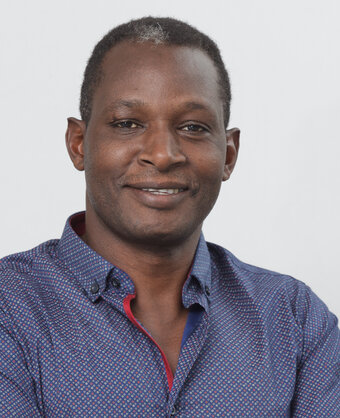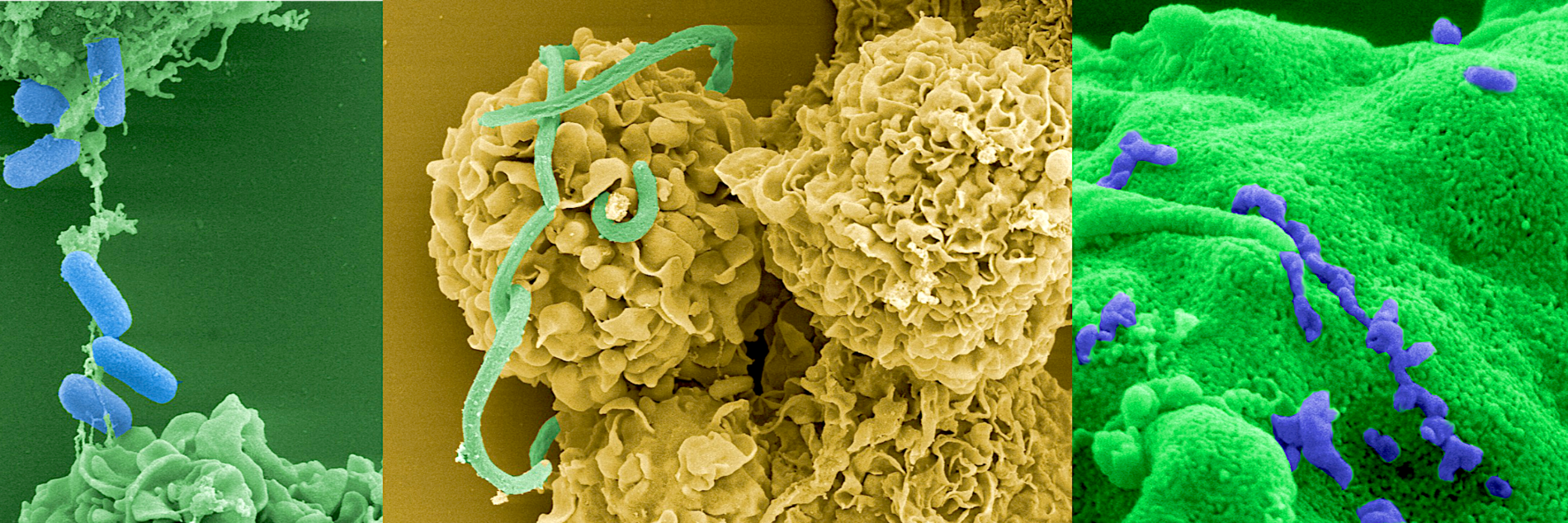
Prof. Dr. Nelson Gekara
Group Leader
nelson.ongondo.gekara@uniklinik-freiburg.de
+49 761 270 83621
Unraveling the Interplay between Innate Immunity and DNA Repair
Our research here in Freiburg University and Stockholm University delves into the intricate relationship between two critical defense systems: the innate immune system and DNA repair mechanisms. These systems are vital for protecting our bodies against external threats and maintaining genomic integrity. However, their dysregulation can lead to a wide range of health issues including infections, inflammation, neurodegeneration, cancer e.t.c.
- Innate immune-DNA Repair Crosstalk: We investigate how innate immunity and DNA repair systems communicate and regulate each other.
- Microbial Influence: We explore how both commensal and pathogenic microbes modulate these defense systems, impacting disease development.
- Therapeutic Potential: Our goal is to identify novel strategies for manipulating these systems to manage various diseases.
By uncovering fundamental cellular processes, we aim to contribute to groundbreaking discoveries that will ultimately benefit human health.
Our body depends on two major defense systems for protection against external and internal threats: 1) the immune system, which mediates pathogen clearance and tissue healing, and 2) the DNA damage response, which senses and repairs DNA breaks, thereby ensuring that our genetic material is preserved. While essential for life, if not properly controlled, these surveillance systems can cause havoc. Indeed, dysregulations in the immune and DNA repair systems lie at the core of many health afflictions, including infections, autoimmune/inflammatory diseases, neurodegenerative diseases, cancer, and other age-associated disorders.
The overarching goal of our research is to understand how the innate immune and DNA repair systems are regulated and to identify new strategies for manipulating these systems in disease management. We have made some progress toward this goal and contributed to our understanding of how the immune and DNA repair systems cross-communicate and the regulatory components involved.
Microbes with established coexistence with their hosts have evolved strategies to manipulate host defenses. Another area of our research interest is how microbes, including the commensal microbiota and pathogens (bacteria and viruses), modulate the immune and DNA repair pathways and how this impacts disease development.
The research in our lab focuses on fundamental cell biological processes with the view that some of our discoveries will benefit human health.
Prof. Dr. Nelson Gekara
Group Leader
nelson.ongondo.gekara@uniklinik-freiburg.de
Office phone: +49 761 270 83621
Dr. Mateo Murillo León
Postdoc
mateo.murillo.leon@uniklinik-freiburg.de
Office phone: +49 761 270 83657 Lab phone: +49 761 270 83684


Manman Jing
PhD Student
manman.jing@uniklinik-freiburg.de
Office phone: +49 761 270 83657 Lab phone: +49 761 270 83684

Jamal Ahodo
M.Sc. Biomedical Sciences
jamal.ahodo@uniklinik-freiburg.de
Lab phone: +49 761 270 83684
Silvia Jiménez
M.Sc. Erasmus-Austauschstudentin
silvia.jimenez@uniklinik-freiburg.de
Lab phone: +49 761 270 83684
Aspirin protects against genotoxicity by promoting genome repair.
Jiang H, Swacha P, Aung KM, Gekara NO. Cell Res. 2023 Apr;33(4):325-327. doi:
10.1038/s41422-023-00783-6- The gut microbiota prime systemic antiviral immunity via the cGAS-STING-IFN-axis. Erttmann SF, Swacha P, Aung KM, Brindefalk B, Jiang H, Härtlova A, Uhlin BE, Wai SN, Gekara NO. (2022). Immunity. 55(5):847-861.e10. doi: 10.1016/j.immuni.2022.04.006
- Nuclear AIM2-Like Receptors Drive Genotoxic Tissue Injury by Inhibiting DNA Repair. Jiang H, Swacha P, Gekara NO. (2021). Advanced Science. 8(22):e2102534. doi: 10.1002/advs.202102534.
- Chromatin-bound cGAS is an inhibitor of DNA repair and hence accelerates genome destabilization and cell death.
Jiang H, Xue X, Panda S, Kawale A, Hooy RM, Liang F, Sohn J, Sung P, Gekara NO. EMBO J. 2019 Sep 23:e102718. doi: 10.15252/embj.2019102718.
- Hydrogen peroxide release by bacteria suppresses inflammasome-dependent innate immunity. Erttmann SF, Gekara NO.
Nat Commun. 2019 Aug 2;10(1):3493. doi: 10.1038/s41467-019-11169-x.
- The deubiquitinase MYSM1 dampens NOD2-mediated inflammation and tissue damage by inactivating the RIP2 complex.
Panda S, Gekara NO.
Nat Commun. 2018 Nov 7;9(1):4654.
- Loss of the DNA Damage Repair Kinase ATM Impairs Inflammasome-Dependent Anti- Bacterial Innate Immunity.
Erttmann SF, Härtlova A, Sloniecka M, Raffi FA, Hosseinzadeh A, Edgren T, Rofougaran R, Resch U, Fällman M, Ek T, Gekara NO.
Immunity. 2016 Jul 19;45(1):106-18.
- Deubiquitinase MYSM1 regulates innate immunity through inactivation of TRAF3 and TRAF6 complexes.
Panda S, Nilsson JA and Gekara NO. Immunity. 2015 Oct 13;43(4).
- DNA damage primes the type I interferon system via the cytosolic DNA sensor STING to promote anti-microbial innate immunity.
Härtlova A, Erttmann SF, Raffi FA, Schmalz AM, Resch U, Anugula S, Lienenklaus S, Nilsson LM, Kröger A, Nilsson JA, Ek T, Weiss S, Gekara NO. Immunity. 2015 Feb 17;42(2):332-43.
- Mast cells elicit proinflammatory but not type I interferon responses upon activation of TLRs by bacteria.
Dietrich N, Rohde M, Geffers R, Kroeger A, Hauser H, Weiss S and Gekara NO.
Proc Natl Acad Sci U S A. 2010 May 11 Vol 107(19):8748-53.
We're recruiting motivated Bachelor's and Master's students to join our team
Ideal candidates:
- Have background in molecular biology, immunology, microbiology, biochemistry or genetics
- Are passionate about the immune system or DNA repair
- Enjoy collaborative team environments
Join us in our quest to unlock the secrets of our body's first line of defense!
- Adela Schmidt, studentische Hilfskraft
Center for Microbiology and Hygiene
Institute for Microbiology and HygieneHermann-Herder-Str. 11
D-79104 Freiburg
www.uniklinik-freiburg.de/mikrobiologie




